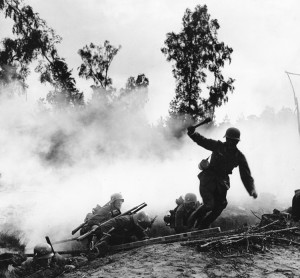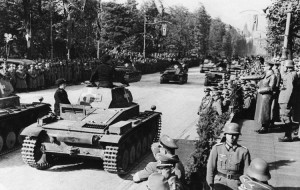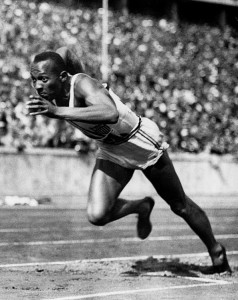80 Years Ago: Germany Invades Poland
Friday, August 30th, 2019August 30, 2019
This Sunday, September 1, marks 80 years since Nazi Germany invaded Poland in 1939. Fighting in Asia had begun years earlier, but Germany’s invasion of Poland is considered the beginning of World War II, the most destructive war in history. World War II eventually drew in more than 50 nations, and more than 50 million people died before the war ended in September 1945.

German troops attack from a trench early in World War II. Germany started the war in Europe by attacking Poland on Sept. 1, 1939, 80 years ago this Sunday. Credit: AP Photo
Germany’s invasion of Poland came after years of problems and shifting attitudes in Germany. The nation’s defeat in World War I (1914-1918) resulted in dire economic and social problems in the 1920′s. Many people longed for the more prosperous pre-war days of the German Empire. In the early 1930′s, political unrest led to the rise of the Nazis, a fascist (extreme authoritarian) political group. The Nazis opposed democracy, Communism, socialism, feminism, and other political systems and movements that claimed to favor equality. The Nazis promised to make Germany great again by building a harmonious, orderly, and strong society. Instead, they brought terrorism, war, and genocide to Germany and other countries.

Adolf Hitler, far right, reviews German tanks as they parade through the streets of Warsaw, Poland, in 1939. Credit: AP/Wide World
In 1933, Adolf Hitler, the leader of the Nazis, was appointed chancellor of Germany. Hitler rapidly increased his own power, and preached that Germans were a “superior race.” He called Jews, Slavs, and other minority groups inferior. He began a campaign of hatred against Jews and Communists and promised to rid the country of them. In this time of distress and economic depression, Hitler’s version of nationalism (an extreme form of patriotism) appealed to many Germans.
Hitler built up Germany’s armed forces. In March 1938, German soldiers marched into neighboring Austria and united it with Germany. At the end of September, Germany seized part of Czechoslovakia. The Czechs came under complete Nazi control in March 1939. Germany’s September invasion of Poland took place after Hitler agreed to divide the country with the Soviet Union. After quick German advances in western Poland, the Soviets invaded Poland from the east on September 17. Attacked from both sides, Poland fell on October 6. The Germans went on to invade other countries (including the Soviet Union) and took control of much of Europe.
The Nazis instituted the Holocaust, the systematic, state-sponsored murder of Jews and other people the Nazis judged politically dangerous or racially or mentally inferior. Historians estimate that the Nazis killed as many as 11 million people, including some 6 million Jews.
The war eventually turned against Nazi Germany, and the Nazis lost control of all areas—including Germany, which was badly damaged in the fighting. Around 5 million Germans died during World War II. Hitler committed suicide on April 30, 1945. Germany surrendered on May 8, ending the war in Europe. Despite the death and destruction brought by Hitler and the Nazis, far-right Neo-Nazi (new Nazi) groups formed after the war in Germany and elsewhere. Neo-Nazis continue to threaten and attack Jews and members of other minority groups.
Nazism and fascism (which also thrived in Italy and Spain) were not unique to Europe. In the United States in the 1930′s, the German American Bund and other groups actively supported the Nazis. The Bund gained a large membership, and in February 1939, it held a rally at New York City’s Madison Square Garden. Some 20,000 people attended the radical Bund rally as around 1,500 police officers held back crowds of anti-fascist protesters outside. The Bund collapsed with the U.S. entry into World War II in December 1941—against Nazi Germany (and Japan).



